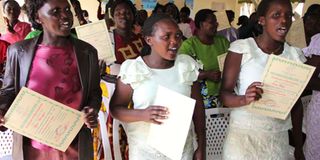Breaking News: At least 10 feared to have drowned in Makueni river
Women ditch booze for clean business

Reformed brewers: Women who previously brewed and consumed illicit brew in Elgeyo-Marakwet County, celebrate after receiving certificates following a five-day training to rehabilitate them.
What you need to know:
- A group of 20 women from Chogoo village in Marakwet West, ditched brewing illegal alcohol, came together to form a development group.
- Kenya Forest Service was impressed by their passion and as a reward and to motivate them, gave them a five-acre piece of land where they started with a hundred cypress seedlings.
- The group grew from the 100 tree seedlings on a nursery bed tucked at one corner of the five-acre piece of land, to the current 850,000 seedlings annually.
In 2017, Elgeyo Marakwet County government rolled out a brewers’ rehabilitation program after an alarm was raised over high levels of local brew consumption in the county.
Hundreds of brewers, mostly women, were enrolled in a rehabilitation exercise which included seminars and training on alternative, legal ways of making a living.
In the group were 20 women from Chogoo village in Marakwet West. Following their rehabilitation, they ditched brewing and came together to form a development group.
Under the patronage of Agnes Kimutai, an anti-brewing crusader, the women registered ‘Cheptengis’ Women Group and started a tree seedling growing exercise. The activity attracted the county’s environment department, which chipped in and supplied them with initial seedlings.
The group chairperson Ms Kimutai, says the seedling business was motivated by the group’s passion to help the county add its forest cover and empower themselves economically.
The county government recently recognised her as a heroine for her efforts in successfully rehabilitating the group of women.
Five-acre piece of land
“Kenya Forest Service was impressed by our passion and as a reward and to motivate us, they gave us a five-acre piece of land where we started with a hundred cypress seedlings,” says an elated Ms Kimutai.
She says the women were very cooperative because having spent many years brewing alcohol, they found something new and more interesting to do.
The group grew from the 100 tree seedlings on a nursery bed tucked at one corner of the five-acre piece of land, to the current 850,000 seedlings annually, making it the biggest non-government tree seedling growing entity in the county.
“Today, we have more than 50 species of both indigenous and exotic tree seedlings, which we sell to other groups, county governments in the North Rift region, environment conservation-based organisations and individual people,” says Ms Kimutai.
The group also has 50,000 macadamia seedlings, which it hopes to sell to farmers in Kerio Valley who have lately embraced growing the crop through the support of the county government of Elgeyo Marakwet.
They have also responded to a call by agricultural experts to diversify and started by growing 7,000 avocado seedlings.
Records seen by nation.africa when we paid a courtesy call to the tree nursery site, show the group earned Sh1.2 million last year, from the tree seedlings sale alone.
With the money, they started a saving scheme to empower themselves economically and expand the group.

Ms Pauline Kosgey, a former illicit liquor brewer in Elgeyo Marakwet County narrates her encounters, regrets in the trade.
“It pleases us that we formerly depended on something that put us at the receiving end of the law but we are now reaping big from the fruits of hard labour and dedication. I could not imagine life would take to this direction,” says group secretary and former brewer Ms Christine Komen.
Ms Komen, 56, says the project has helped her pay school fees for her children and buy a dairy cow.
“Instead of illegal alcohol, I now sell milk to my neighbours, which to me, is a transformation I never thought would happen,” says Ms Komen.
Julia Siloi, another member of the group narrates how at the height of the brewing business her family fell apart and she separated with her husband.
“Apart from brewing and selling local brew, I was also a heavy consumer, so the little money I made from alcohol sales would go back to buying the same for myself,” says Ms Siloi.
The 38-year old says she always fought with her husbands and children, making them fall apart because there was no food for the family.
Today, Ms Siloi says her family is back together and engaging in farming activities that have improved their lives.
Tree seedlings
“Since I stopped brewing for this tree seedlings group, life has become so good for us. Every Sunday, we hold hands and walk to church,” says Ms Siloi on a light note.
Susan Kaino, 60 says local brew had always been part of her life, having been brought up by alcoholic parents. She, in turn, ended up brewing for 20 years with nothing substantial to show for it.
“I picked up the brewing business, which became the greatest unfolding in my life. Half of my children who are now grown up, did not attend school because I was so into brewing and forgot them. Even though life has changed for me, I feel guilty that I am the cause of their struggle,” says Ms Kaino.
She says she has since enrolled them in short courses including tailoring and hairdressing to enable them have a means of their own.
The group now targets to supply tree seedlings to large multinationals and groups across the country.
They, however, say constant supply of water is their biggest challenge. Each dry season costs them a lot because they have to physically irrigate the nursery beds with water drawn from a nearby river.
Despite that, they target to get Elgeyo Marakwet from the current second to first position in terms of forest cover in the country.





